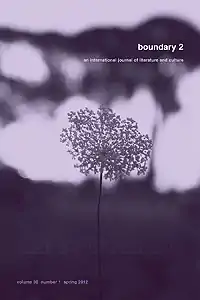Boundary 2
Boundary 2, often stylized boundary 2, is a quarterly peer-reviewed[1] academic journal of postmodern theory, literature, and culture.[2] Established in 1972[1] by William V. Spanos and Robert Kroetsch (Binghamton University), under the title boundary 2, a journal of postmodern literature, the journal moved to Duke University Press in the late 1980s[3] and is now edited by Paul A. Bové (University of Pittsburgh).[4]
 | |
| Discipline | Literature |
|---|---|
| Language | English |
| Edited by | Paul A. Bové |
| Publication details | |
| History | 1972–present |
| Publisher | Duke University Press (United States) |
| Frequency | Triannually |
| Standard abbreviations | |
| ISO 4 | Bound. 2 |
| Indexing | |
| ISSN | 0190-3659 (print) 1527-2141 (web) |
| LCCN | 72626433 |
| JSTOR | 01903659 |
| OCLC no. | 1408678 |
| Links | |
Since the early 2000s the journal has been closed to unsolicited submissions.[5] This policy was described by Jeffrey Williams, editor of Minnesota Review, as one that "seems a little too closed, and would go in the opposite direction of taking chances".[6] boundary 2 has published special issues focusing on postmodernism in individual countries such as Greece[7] or Canada,[8] as well as a book of articles previously published in the journal.[9] In an interview published in the Minnesota Review, Spanos discusses the history of the journal, its financial and editorial problems, and the motivations for various changes over the years, including the journal's practice of publishing articles by invitation only, refusing unsolicited submissions.[6]
The Boundary 2 editorial collective also publishes an online-only, open access peer-reviewed journal called b2o: an online journal, which appears two or three times each year.[10]
Abstracting and indexing
The journal is abstracted and indexed in:
- Academic Search Elite
- Academic Search Premier
- Arts and Humanities Citation Index
- Current Contents/Arts and Humanities
- Current Contents/ Social & Behavioral Sciences
- Expanded Academic ASAP
- EBSCO databases
- International Bibliography of Periodical Literature
- MLA Bibliography
- Scopus
- Social Sciences Citation Index
- Sociological Abstracts
References
- "boundary 2". Ulrich'sWeb. ProQuest, LLC. Retrieved 18 May 2012. (subscription required)
- Williams, Jeffrey J. (Fall 2006). "The Counter-Memory of Postmodernism: An Interview with William V. Spanos". The Minnesota Review. 2006 (67): 47–63. doi:10.1215/00265667-2006-67-47. Retrieved 18 May 2012.
- "About boundary2". boundary 2. Retrieved 10 December 2018.
- Colman, Adam (April 10, 2008). "Academic journal boundary 2, edited in Pittsburgh, has a national reputation". Pittsburgh City Paper. Retrieved 18 May 2012.
- "Editorial correspondence (Back Matter boundary 2)" (PDF). Duke University Press. Retrieved 18 May 2012.
- Williams, Jeffrey J. (Fall 2006). "The Counter-Memory of Postmodernism: An Interview with William V. Spanos". The Minnesota Review. 2006 (67): 47–63. doi:10.1215/00265667-2006-67-47. Retrieved 18 May 2012.
- Papanikolaou, Dimitris (2005). "Greece as a postmodern example: Boundary 2 and its special issue on Greece" (PDF). Καμποσ: Cambridge Papers in Modern Greek (13). Archived from the original (PDF) on 14 August 2014. Retrieved 18 May 2012.
- Kroetsch, Robert (October 2010). "boundary 2 and the Canadian postmodern". In Robert David Stacey (ed.). Re: Reading the Postmodern: Canadian Literature and Criticism After Modernism. University of Ottawa Press. pp. 1–7. ISBN 9780776607399. Retrieved 18 May 2012.
- Bové, Paul (1995). Early Postmodernism: Foundational Essays. Duke University Press. ISBN 9780822316497.
- "about b2o: an online journal". b2o: an online journal. Retrieved January 28, 2019.
Further reading
- Bové, Paul A. (editor) (1995). Early Postmodernism: Foundational Essays. a boundary 2 book. Durham, NC: Duke University Press. p. 276. ISBN 978-0-8223-1649-7. OCLC 32238059.CS1 maint: extra text: authors list (link)
- Spanos, William V. (Autumn 1972). "The Detective and the Boundary: Some Notes on the Postmodern Literary Imagination" (free full text copy). Boundary 2. Durham, NC: Duke University Press. 01 (1): 147–168. doi:10.2307/302058. JSTOR 302058.